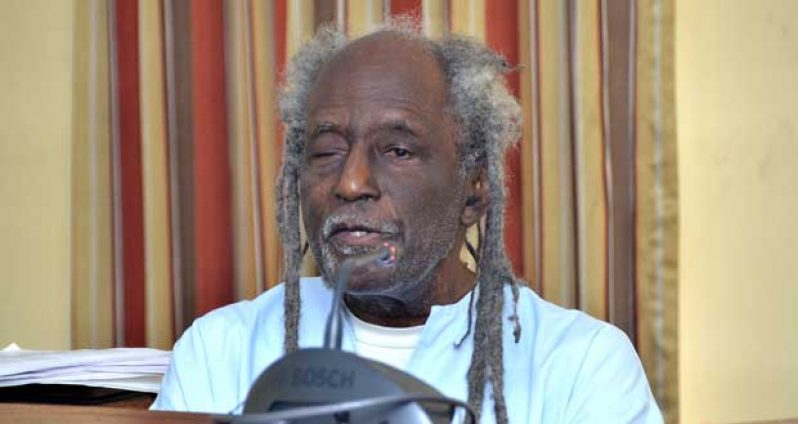Kwayana tells inquiry PNC cannot escape responsibility
CO-FOUNDER of the Working People’s Alliance (WPA), Eusi Kwayana, told the Commission of Inquiry (COI) into the death of Dr. Walter Rodney Thursday that his core belief is that the People’s National Congress (PNC) was involved in the assassination.
Under cross-examination by attorney-at-law Mr. Basil Williams, who is watching the interest of that political party, Kwayana said, judging from all of the circumstances, he was “convinced” that the then ruling party was involved, as it was in charge of State machinery, including the Ministry of Defence, and held responsibility for all other Ministries that were capable of giving directions to intelligence officers.
“The PNC cannot escape responsibility,” Kwayana said, based on the remarks made by its Leader, Forbes Burnham, who had uttered death threats to the WPA.
Furthermore, Kwayana pointed out that, following the murder of Rodney, vigorous investigation by the State was absent.
The octogenarian had been called to the witness stand for the third time yesterday in the COI that was ordered by President Donald Ramotar last February.
The proceedings continued in the Supreme Court Law Library before Commissioners Sir Richard Cheltenham, Seenath Jairam and Jacqueline Samuels-Brown.
Kwayana was led by Lead Counsel to the Commission Glen Hanoman before being cross-examined by Williams.
The witness testified that members of the WPA never sought to gain power but the focus was on improving Guyana’s politics and resolving racial issues in the country.
First publication
He said ever since the PNC Government banned the WPA’s first publication of the ‘Day Clean’ newspaper, that was coming from Trinidad, he knew that the Government was hostile to the WPA.
No one in Guyana would print it for fear of repercussions from the Government and so the WPA had tried to have it printed in Trinidad.
According to Kwayana, there was a communication problem in the country as telephones were short. In fact, the WPA’s ‘Tiger Bay’ office had no telephone.
“If favourite people wanted a line, they could get one overnight,” Kwayana recalled, but said often the answer, from the authorities, would be that there was none.
Kwayana provided these details to show the usefulness of the ‘walkie talkies’ in those days. “The walkie talkie helped to cover spaces. Rodney had found a way of getting them and tuning them up for use.”
From all the evidence available to him, Kwayana said his conviction is that Gregory Smith must be held responsible for Rodney’s assassination.
“I don’t think he was acting on his own,” the witness said, adding that the entire operation showed State involvement. “He was under orders. He had to receive his orders from some person he was bound to obey.”
Kwayana further testified that Brigadier Norman Mc Clean was heading the Guyana Defence Force (GDF) at a time when the political system had been corrupted. “It was not a normal state,” he asserted.
He said Burnham became Commander-in-Chief of the Army in October 1980 but prior to then he was the Minister of Defence. The GDF was an institution that fell under this Ministry, Kwayana stated.
Kwayana recalled that the collective leadership of the WPA included himself, Dr. Rodney, Dr. Clive Thomas, Dr. Rupert Roopnarine, Moses Bhagwan, Andaiye and Tacoma Ogunseye.
Extremely remote
In the WPA, he said the idea of violence was extremely remote and denied knowing of any effort to form a military wing in the party. He also denied knowing about any move to obtain weapons, though being aware that WPA members were formally accused of having.
David Hinds, for instance, was convicted of having weapons. He was accused of bringing such into the country in a suitcase but the weapons were never produced during the trial, Kwayana swore.
He said, further, that “Rodney had no propensity to violence” but was a student of social change.
In February 1980, he remembered Rodney as saying that violence is always regrettable.
He said all in the WPA felt threatened but this did not stop them from pursuing their goals. In fact, he remembered Rodney saying in a speech that if he should fall, people should use his body as a barricade.
Kwayana said Rodney did nothing to warrant someone using violence on him.
(By Telesha Ramnarine)



.jpg)








